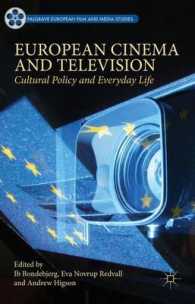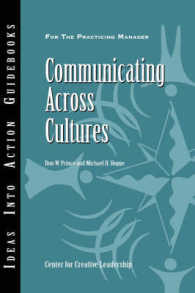Full Description
Gerhard was one of the most visionary composers of the twentieth century drawing together ideas from science, philosophy, and the arts into an oeuvre that encompasses the folk song of his native Catalonia, to serialism and electronic music. The composer lived through some of the most tumultuous times in recent memory including the Spanish Civil War and the Second World War as an exile in England. This edited volume uniquely brings together specialists in Spanish cultural studies, exile, musicology, and analysis to explore how these events and the post-war cultural and political climate shaped Gerhard's life and work.
Contents
i: Rachel E. Mann and Monty Adkins: Introduction
1: Monty Adkins: Gerhard's Cultural Milieu: An Explorer and a Survivor
2: Sebastiaan Faber: The Forgotten Legacies of Spanish Civil War Exile: Dispersed, Diverse, Divided
3: Magda Polo Pujadas: The Musical Aesthetic of Robert Gerhard (1914-1938)
4: Benjamin K. Davies: Between Heuristic and Hypostatisation
5: Francis Lough: National Identity and Spanish Republican Exile
6: Samuel Llano: Exile, Music, and Cultural Translation: Gerhard's Transnational Chronotopes
7: Leticia Sánchez de Andrés: Roberto Gerhard's First Decade of Exile (1939-49): Rootlessness and Survival
8: Mark E. Perry: Gerhard as Composer in Exile
9: Judy-Ann Desrosiers: Memoir of The Spanish Civil War: A Political Reading of Roberto Gerhard's Ballet Pandora
10: Mari Paz Balibrea: 'Staple of the Contemporary Music Scene': Roberto Gerhard in Geopolitical Perspective
11: Marco Ramelli: The Influence of the Spanish Civil War in Gerhard's Guitar Music
12: Belén Pérez Castillo: Roberto Gerhard's Cantares: Seven Songs of Absence ... and a Presence
13: Julian White: 'Smiling Bravely at the Night': Roberto Gerhard's S ymphony No. 3, 'Collages' and Albert Camus's 'Retour à Tipasa'
14: Rachel E. Mann: A Voice Apart: Constructing a Cosmopolitan Identity in Exile






